Gas cylinders in the restaurant: important rules for installation and use
January 4, 2023, Common articles
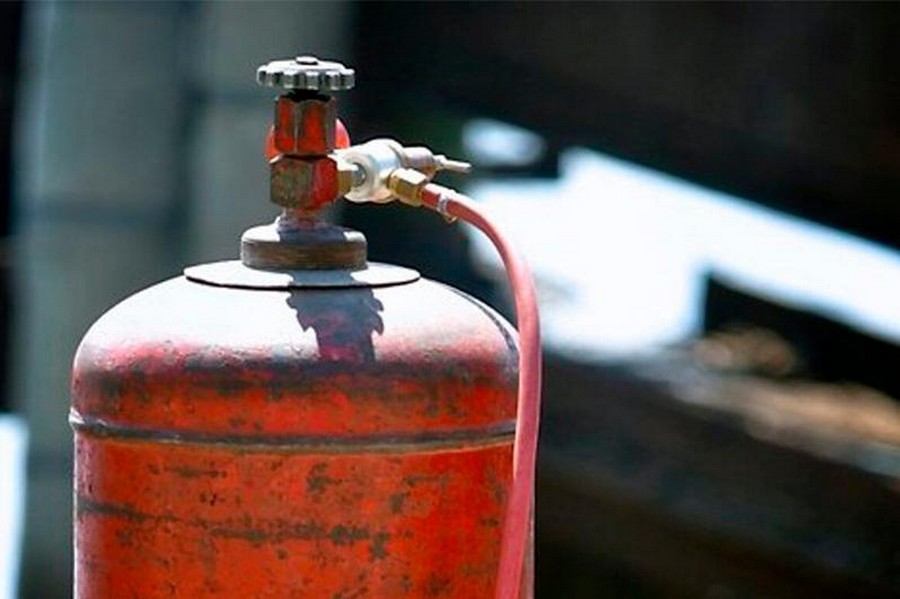
Together with Yevhen Komarov, a lawyer and BDO of the Global Law Law Firm, we understand how to install and use gas cylinders in the institution in order to act within the limits of the law and not put ourselves, the team and the guests at risk.
The source
We remind you that responsibility for the technical condition and safe operation of gas cylinders and gas equipment lies with the owners. And in the worst cases, it can be about not only material and administrative but also criminal liability.
Reasons for which accidents occur most often.
- Unauthorized gasification of catering establishments - without obtaining the necessary permits and without the involvement of specialists.
- Unauthorized installation of additional gas equipment and cylinders of liquefied hydrocarbon gas without design documentation and in rooms not intended for this purpose.
- Low-quality inspection of the technical condition of smoke and ventilation ducts in the facility.
- Violation of safety rules during the installation and operation of gas cylinders.
- Cases when institutions deny access to gas equipment inspection and repair to employees of specialized gas enterprises.
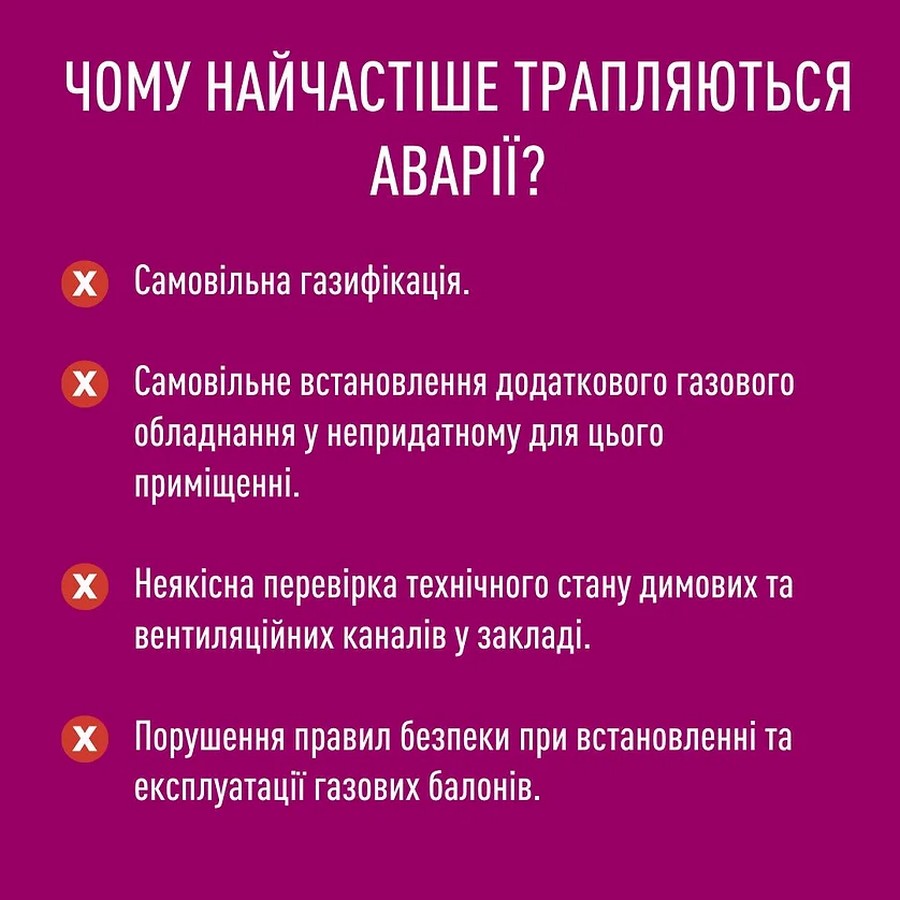
What to do:
- Contact a specialized enterprise in the gas industry with a request for the installation of cylinders. Only they can guarantee the correct installation of cylinders and their sealing.
- Buy cylinders of liquefied hydrocarbon gases only in specialized stores. The employees of gas filling stations are responsible for supplying gas in cylinders, as well as replacing gas cylinders.
- Install gas cylinder installations of liquefied hydrocarbon gas only according to the relevant project documentation.
- Properly train people who will use cylinders in the facility: they must undergo training and knowledge testing on occupational health and safety issues, be instructed in safe methods of working with gas cylinders, keep gas cylinders clean, monitor the normal operation of gas equipment, chimneys and ventilation, check the draft before switching on and during operation of gas appliances with the removal of gas combustion products into the chimney. After the end of gas use, they must close the taps on gas appliances and in front of them, and when placing the cylinders inside the kitchens, additionally close the valves on the cylinders.
- Before turning on the light or lighting a fire in the basement, you should always make sure that there is no smell of gas. In the event of a malfunction of gas equipment, it is necessary to stop using gas appliances and call specialists. If the smell of gas appears in the room, it is necessary to immediately stop using gas appliances, close the taps to the appliances and on the appliances, and open the windows and windows to ventilate the room. Emergency services must be called. While she is driving, it is forbidden to light a fire, or smoke, turn on and off electric lighting and electrical appliances, use electric tools, electric bells, mobile phones, etc.
- No more than one cylinder with a capacity of 50 (55) litres or two cylinders with a capacity of 27 litres each can be placed in a gasified room. Cylinders must be in the same room as gas appliances.
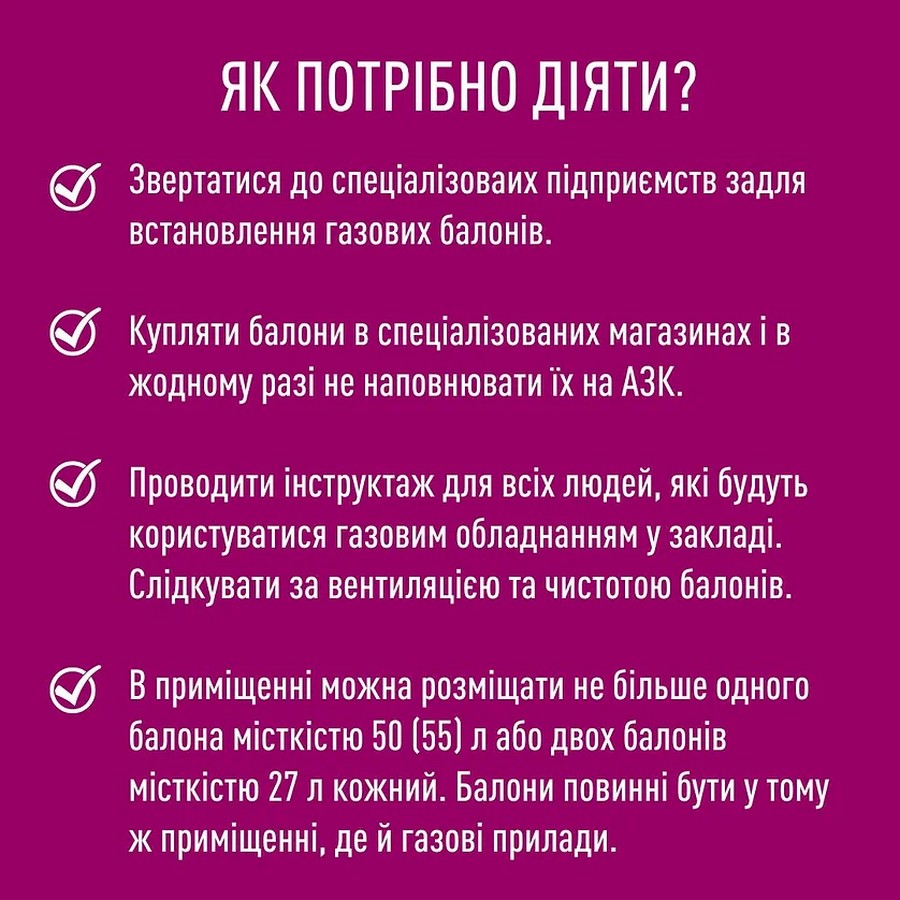
What is strictly forbidden to do:
- It is forbidden to carry out spontaneous gasification of public catering establishments, rearrangement, replacement and repair of gas equipment.
- It is impossible to carry out the redevelopment of premises where gas appliances are installed without agreement with the gas distribution company; it is impossible to make changes to the design of gas appliances. It is also forbidden to change the smoke and ventilation systems, to seal the ventilation ducts, and to brick up "pockets" and hatches intended for cleaning chimneys.
- Gas cylinders cannot be filled at car gas stations. If gas stations do not have special equipment to control the degree of filling, the use of such gas cylinders is a mortal danger.
- It is forbidden to turn off automatic safety and regulation, and to use gas in the event of a malfunction of gas devices, automation, fittings and gas cylinders. It is strictly forbidden to try to repair the gas system yourself if something is not working properly. Moreover, you cannot use the equipment if there is a smell of gas in the room.
- It is not possible to use gas if the chimneys and ventilation ducts are clogged, lacks their density, malfunctions and blockage of the chimney heads.
- It is forbidden to use gas appliances when there are closed windows (transoms), louvre grilles, fan grilles, and a lack of draft in chimneys and ventilation ducts.
- In no case should you leave working gas appliances unattended, except for those designed for continuous operation and equipped for this purpose with appropriate automation.
- Persons who do not control their actions or who have not received appropriate instruction must not be allowed to use gas appliances.
- It is forbidden to use gas stoves for heating the premises.
- Rooms with gas appliances cannot be used for sleeping and relaxing.
- It is forbidden to use an open flame to detect gas leaks.
- Empty cylinders and cylinders filled with liquefied gases cannot be stored in rooms and basements.
- It is not possible to turn on and off electric lighting, use open flames, electric heating devices and heating furnaces during the replacement of cylinders installed in the premises.
- It is forbidden to replace the cylinders in the presence of persons unrelated to the performance of the indicated work.
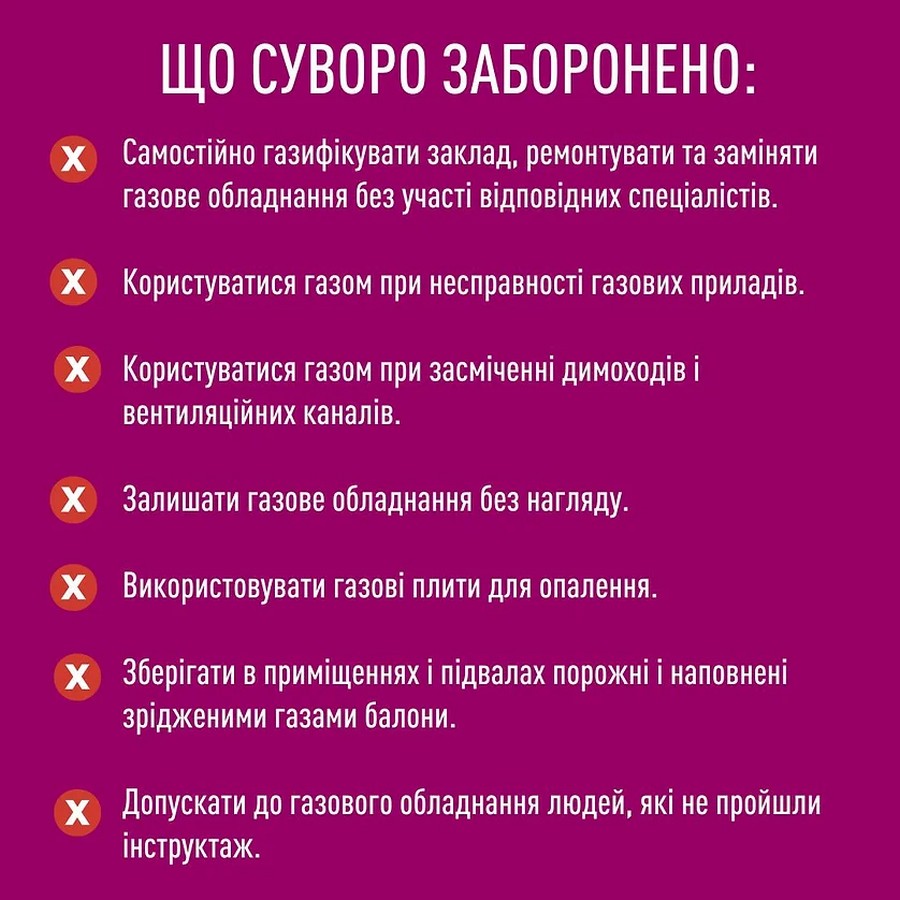
Where it is possible and where it is not possible to install gas appliances.
- Individual gas cylinder installations can be installed near the outer walls of buildings at a distance of at least 0.5 m from the doors and windows of the first floor and 3 m from the windows and doors of the basement and basement floors.
- It is forbidden to place individual gas cylinder installations and gas appliances in the basement and basement floors (basements). It is also forbidden to install them on premises under which there are basements and cellars, and the entrance to them is carried out from these premises; on balconies and loggias; in rooms without natural lighting, in rooms located under the dining and sales halls of public catering enterprises, as well as under other rooms in which more than 50 people can be at the same time.
- It is also not possible to place individual gas cylinder installations near emergency (fire) exits, from the side of the facades of buildings, in passages for transport.
- You cannot install gas cylinders in a gasified room at a distance of less than one meter from a heating radiator or stove; place the cylinders in front of the fuel doors of the furnaces at a distance of fewer than 2 meters.
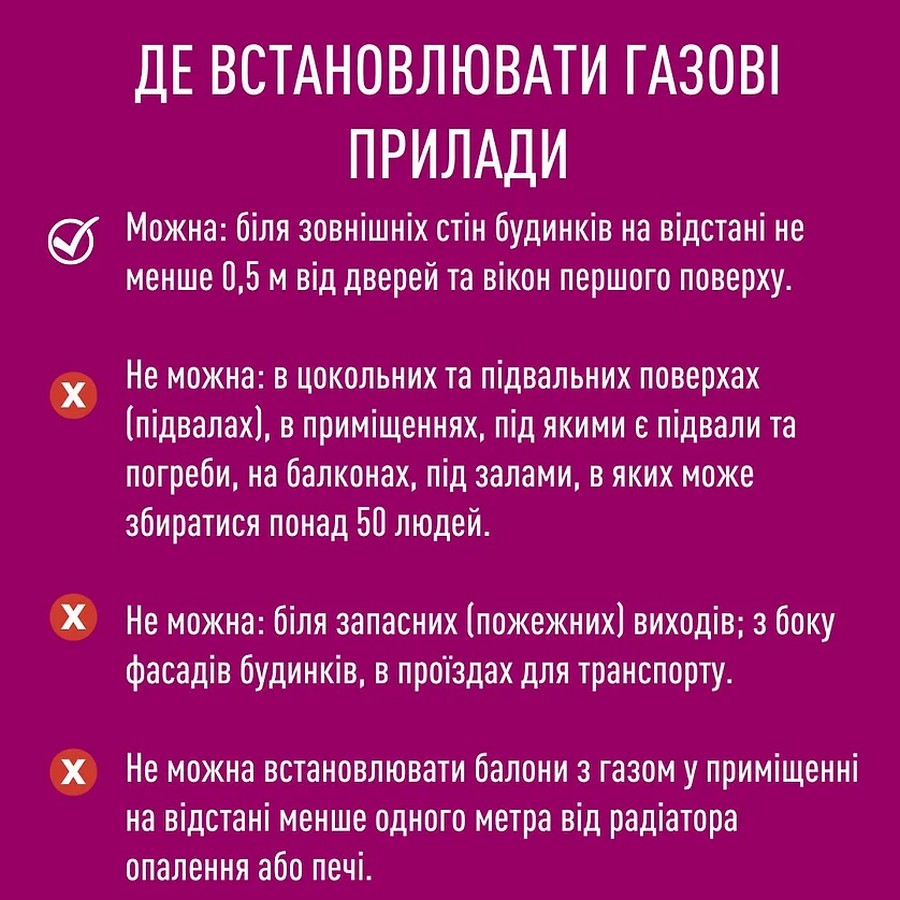
Views: total 893, of which 3 today
comments (0) add →